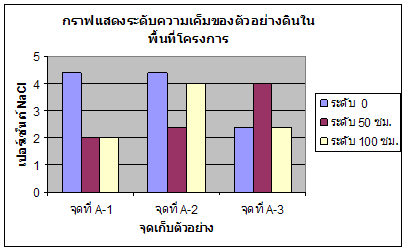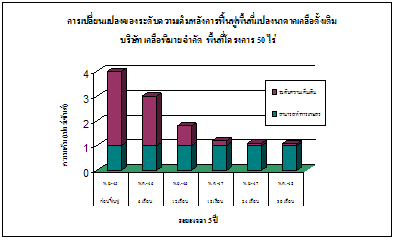The environment has been affected by traditional rock-salt mining.
1974, Pimai Salt Co., Ltd. produced salt by using the evaporated salt field. This process is similar to the sea salt field. More than twenty years ago, Pimai Salt Co., Ltd. completely terminated the process of salt field production. However, the salt field is still unfertile and saline problem.


Environmental problem


Saline distribution


The unfertile land can not be used for agriculture.


An attempt to recover and resolve the salted land of Pimai Salt Co., Ltd.
Pimai Co., Ltd's is marking an effort to solve the salinity problem by tress and grass growing on the salinity field under the employee's cooperation from 1998 to 2003.




Organic matter was added into the soil to decrease the salinity problem.
However, it is not completely successful. The salinity problem is still complicate. It's requires the high investment, know-how and technology to recover the salinity of the field.








In the late of 2003, Pimai Salt Co., Ltd. found that the research group at National Center for Genetic Engineering and Biotechnology (BIOTEC), National Science and Technology Development Agency (NSTDA) has experience in the salt tolerant plant and bioremediation. Thus, bioremediation Project was established under the cooperation between Pimai Salt Co., Ltd. and BIOTEC. This project compose of two phases.
1. Bioremediation using the salt tolerant tree Project was established on a 8 hectares salinity land for 3 years from 2003 to 2005
Project activity
Survey and salinity land determination
| Project area | Salinity soil sampling |
 |
 |
Soil restructure by physical processes Salinity decreasing by gypsum powder
| Ridge and salted water sewerage leveling | Salt removal by plaster. |
 |
 |
| Watering system setting | Watering by dipping system |
 |
 |
The soil restructured by organic substance Added bark and organic fertilizer to increase the soil fertility
| Organic substance adding in to the soil. | Using chaff and muck to fertilize the soil. |
 |
 |
 |
 |
Sesbania was grown to increase the soil fertility before growing salt tolerant tree.
| Sesbania germination | Sesbania is flowering |
 |
 |
Sesbania is flowering and setting the seed.

Growing of salt tolerant tree
Director committee of Pimai Salt Co,.Ltd., Dr.Dhiraphorn Srifuengfung, sheriff of Pimai, Mr. Thongsuk parithamma , Vice director of BIOTEC, Miss Darunee Edward, Factory manager of Pimai Salt Co., Ltd., Mr. Arun Incharoensakdi, and an expert of salt tolerant plant of BIOTEC, Dr. Chalermpol Kirdmanee attended the ceremony of salt tolerant plant growing
| The executive board attened the ceremony of salt tolerant plant growing. | Mr.Arun Incharoensakdi,factory director, presented the progress report. |
 |
 |
| Miss Darunee Edward, vice director of BIOTEC | Dr. Chalermpol Kirdmanee, an expert in salt tolerant tree. |
 |
 |
| Mr. Thongsuk parithamma, Pimai sheriff. | Mr. Arun Incharoensakdi and Miss Darunee Edward |
 |
 |
Pimai employees have cooperated to grow the salt tolerant trees.



Salt tolerant trees after growing for 1-2 years.





2. Bioremediation on salinity land project through research and development on rice cultivation and rice improvement was established on 0.8 hectares saline land in 3 years from 2006 to 2008
Project activity
Rice field preparation for growing.
| Land was cleared the concrete and designed the rice plot. | Plowing before planting |
 |
 |
| Seed germination plot preparation | Germinated seed |
 |
 |
Rice growing ceremony on 15 June 2004, Pimai sheriff, Pimai executives, BIOTEC executives and community leader jointed to grow the Hommali rice on the saline land.




The yield of Hommali rice grown on the saline land.
Rice produced the panicle prior to harvesting.
Dr. Boonsong srifuengfung, Board president, Pimai sheriff, Mr. Thongsuk Paritamma, Dr. Dhiraphorn Srifuengfung, and leaders of the community looking forward to a successful harvest an rice yields.
| Dr. Boonsong Srifuengfung and Mr. Arun Incharoensakdi | Mrs. Daranee Attanan |
 |
 |
Hommali rice crop on the salted land in 2006.
| Rice seedlings were grown in the transplanting tray for salt-tolerant improvement. | Hommali rice seedlings were grown in the transplanting plot for cultivation development. |
 |
 |
| After germination for 20 days, seedlings were acclimatized in the rice field before transplanting. | After germination for 1 month, seedlings were transplanted to the rice field. |
 |
 |
| Rice seedlings were grown for 1 month in the field for the salt tolerant improvement. | Hommali seedlings were grown for 1 month in field for the cultivation development. |
 |
 |
| Rice developed to the flowering bud. | Rice developed the sprout before flowering bud initiation. |
 |
 |
Rice shows the panicle before harvesting.

Dr. Chalermpol Kirdmanee, expert in the salt tolerant plant, collected the rice samples for salt absorption analysis.
Water was flooded in to the saline land and then saline water was pumped to produce produce the salt in the environmental friendly factory system.
Bioremediation using salt tolerant plant, rice cultivation development and salt tolerant rice improvement were used in experiment at the Pimai salt field since in 2003 and will be ended in 2008. The salinity concentration decreases from 4% to be < 1% salt concentration. At present, this land can be used for agricultural propose again.
The figure shows the salinity concentration of soil sample.

The figure shows the decreasing in salinity concentration.






